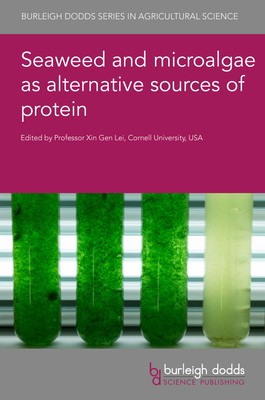
- We will send in 10–14 business days.
- Publisher: Burleigh Dodds Science Publishing Ltd
- Year: 2021
- Pages: 300
- ISBN-10: 1786766205
- ISBN-13: 9781786766205
- Format: 15.2 x 22.9 x 2.1 cm, kieti viršeliai
- Language: English
- SAVE -10% with code: EXTRA
Seaweed and Microalgae as Alternative Sources of Protein (e-book) (used book) | bookbook.eu
Reviews
Description
As the global demand for meat increases due to population and economic growth, more pressure has been placed on the animal feed sector to support sustainable livestock production, whilst also ensuring the nutritional value and palatability of feed. With traditional sources of protein, including oilseeds and distiller grains, considered as major contributors to climate change, there is growing interest in establishing alternative, more 'climate-smart' sources of protein, such as seaweed and other forms of microalgae that can supplement livestock diets.
Seaweed and microalgae as alternative sources of protein summarises current advances in utilising macroalgae and microalgae as alternative sources of proteins. The collection reviews processes of protein formation in macroalgae and microalgae, macroalgae farming and processing as well as microalgae bioprocessing. Chapters also discuss the practical application of seaweed as an alternative protein source in ruminant, pig, poultry and fish diets.
Edited by Professor Xin Gen Lei, Cornell University, USA, Seaweed and microalgae as alternative sources of protein will be a standard reference for researchers from universities or other research centres involved in macroalgae/microalgae production and livestock nutrition, companies involved in the manufacture or supply of animal feed or livestock nutrition services, government and other agencies regulating the animal feed sector, as well as farmers interested in furthering their knowledge on recent developments in the animal feed/livestock nutrition sector.
EXTRA 10 % discount with code: EXTRA
The promotion ends in 21d.09:35:07
The discount code is valid when purchasing from 10 €. Discounts do not stack.
- Publisher: Burleigh Dodds Science Publishing Ltd
- Year: 2021
- Pages: 300
- ISBN-10: 1786766205
- ISBN-13: 9781786766205
- Format: 15.2 x 22.9 x 2.1 cm, kieti viršeliai
- Language: English English
As the global demand for meat increases due to population and economic growth, more pressure has been placed on the animal feed sector to support sustainable livestock production, whilst also ensuring the nutritional value and palatability of feed. With traditional sources of protein, including oilseeds and distiller grains, considered as major contributors to climate change, there is growing interest in establishing alternative, more 'climate-smart' sources of protein, such as seaweed and other forms of microalgae that can supplement livestock diets.
Seaweed and microalgae as alternative sources of protein summarises current advances in utilising macroalgae and microalgae as alternative sources of proteins. The collection reviews processes of protein formation in macroalgae and microalgae, macroalgae farming and processing as well as microalgae bioprocessing. Chapters also discuss the practical application of seaweed as an alternative protein source in ruminant, pig, poultry and fish diets.
Edited by Professor Xin Gen Lei, Cornell University, USA, Seaweed and microalgae as alternative sources of protein will be a standard reference for researchers from universities or other research centres involved in macroalgae/microalgae production and livestock nutrition, companies involved in the manufacture or supply of animal feed or livestock nutrition services, government and other agencies regulating the animal feed sector, as well as farmers interested in furthering their knowledge on recent developments in the animal feed/livestock nutrition sector.


Reviews